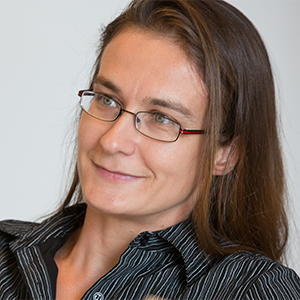Claudia Perlich
 Claudia Perlich
Claudia Perlich
Two Sigma
Stern School of Business, New York University
Educational Background
PhD, Information Systems, Stern School of Business, New York University
MSc, Information Systems, Stern School of Business, New York University
MSc, Computer Science, Technical University Darmstadt
MSc, Computer Science, University of Colorado
BS, Computer Science, Technical University Darmstadt
Claudia was born in 1974 near Leipzig, East Germany. The daughter of a radiology technician and an electrical engineer who ran a small research and development group at an electronics firm, Perlich took a roundabout path into the field of data science. She expressed an early interest in biology, but she ultimately didn’t find it appealing as a career path; there seemed to be few career prospects in the field—a real concern in the years immediately following the fall of the Berlin Wall.
Still, Perlich had shown an aptitude for math, had successfully participated in a number of local math olympics, and wanted to pursue a career in a STEM field. Her father—having worked on replicating the IBM 360—foresaw that computer-related skills would be in demand, so Perlich decided to study computer science on his advice. She performed her undergraduate studies at the University of Darmstadt. Later, following a stint as an exchange student at the University of Colorado, Boulder, she earned MS degrees in computer science there, along with another one from Technical University Darmstadt.
In 1995, at Boulder, Perlich took a course on artificial neural networks (intrigued by their relationship with biology and brain science). She also took a course in AI, for which she wrote a LISP program designed to beat her in checkers. These were her first encounters with artificial intelligence and machine learning, and she was intrigued—not so much by artificial intelligence itself, but by the data sets on which AI algorithms relied. “It’s incredible how much you can learn about people without having to talk to them,” Perlich joked. More seriously, Perlich says, she’s always been curious and relishes the opportunity to work on many things. Working with data, she said, the variety of different domains one can explore seems almost infinite.
Among the aspects of data science Perlich appreciates most is the subtle skill of trying to find what she calls the “little quirks” in a data set. “It’s like doing detective work,” she said. “Unlike in other areas of computer science, where it’s clear whether a solution is right or wrong, with data, things are never what they seem. There’s an art to it. It’s never black and white. And that challenge always captivated me.”
Perlich did not receive much formal training in statistics (though she loved econometrics). However, she observed that traditional statistical approaches like the central limit theorem can be somewhat disconnected from the actuality of real-world data. The real world doesn’t look like averages, she noted, adding that she’s never encountered an IID (independent and identically distributed) problem in her entire career. With real-world data, much comes down to intuition, to developing a sense of the “flavor” of a data set to detect its idiosyncrasies.
Perlich went on to earn a PhD from New York University, after which she served as a research staff member at IBM’s T.J. Watson Research Center, where her work centered on data analytics and machine learning for complex real-world domains and applications. She also served as chief scientist at Dstillery, where she developed machine learning applications for digital advertising. Currently, she is an adjunct professor at NYU’s Stern School of Business and a senior data scientist at Two Sigma.
Throughout her career, Perlich has maintained a strong connection with the academic world. This connection has enabled some of her proudest professional accomplishments, such as serving as general chair (and the first female chair) of the Association for Computing Machinery’s 2014 Knowledge Discovery and Data Mining (KDD) Conference. In that capacity, she chose the theme “Data Science for Social Good” for the 2,200-person conference. Her chief aim was to build and strengthen the community around data-philanthropy organizations such as the AI for Good Foundation, United Nations Global Pulse, Data and Society, DataKind, and Two Sigma’s Data Clinic.
Perlich’s connection with KDD runs deep. Between 2007 and 2009, her team won the KDD Cup three consecutive years. The cup started in 1997 and was the first machine learning competition that, for a given data set, recognizes the most accurate predictive model. This concept became the blueprint for Kaggle’s competition platform and the million-dollar Netflix Prize competition. Perlich also won two best paper awards from KDD—one for a research paper on “leakage,” a pervasive issue in data science that refers to the data collection process itself affecting the outcome of predictions made from that data, and one for an applied research paper on bid optimization and inventory scoring in targeted online advertising.

















